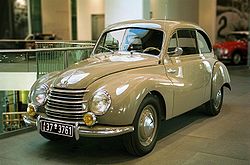DKW F89
| DKW | |
|---|---|
|
DKW F89 P master class
|
|
| F89 master class | |
| Production period: | 1950-1954 |
| Class : | Small car |
| Body versions : | Sedan , convertible , coupé , station wagon |
| Engines: |
Otto engine : 0.7 liters (17 kW) |
| Length: | 4055-4200 mm |
| Width: | 1520-1600 mm |
| Height: | 1450-1555 mm |
| Wheelbase : | 2350-2450 mm |
| Empty weight : | 860-900 kg |
| successor | DKW F91 |
The DKW F89 was the first car of the newly founded Auto Union in West Germany in 1950 and was sold under the name "Meisterklasse".
General
The DKW "Meisterklasse" had the body of the DKW F9 planned for 1940 . The body was made of sheet steel. The frame, chassis and engine came from the DKW F8 , the model designation reflects this: F8-9: engine from F8, body from F9. In contrast to the F8, the engine was installed in front of the front axle and the radiator behind it. The car was characterized by a drag coefficient (c w value) of 0.34 and the trade press praised its high level of driving safety, due to the front-wheel drive , the hydraulically operated drum brakes (front duplex ) and the rear floating axle , a rigid axle on pushrods and higher Transverse leaf spring.
The car rolled off the assembly line in the former armaments factory II in Düsseldorf-Derendorf , which was taken over by Rheinmetall-Borsig , after Auto Union lost its production facilities located in the Soviet occupation zone .
In October 1951 a station wagon called the F89 U "Universal" followed with a structure in a wood-steel composite construction, which was replaced in March 1953 by an all-steel body.
By the end of production in April 1954, 59,475 sedans and 6,415 station wagons had been built. Karmann in Osnabrück produced 5010 four-seater convertibles, Hebmüller in Wülfrath produced small numbers of two-seater convertibles and coupés.
With the technology of the F89, a delivery van with the designation F89 L was also created ; For details see under DKW Schnellaster .
Technical specifications
| DKW "Master Class" F 89 P / F 89 U (1950–1954) | |
|---|---|
| engine |
Two-cylinder two - stroke in - line engine ( parallel twin ), transversely in front of the front axle |
| Displacement | 684 cc |
| Bore × stroke | 76 × 76 mm |
| Power at 1 / min | 23 hp (17 kW) at 4500 |
| Mixture preparation | Solex - downdraft carburetor |
| cooling | Water ( thermosiphon ) |
| transmission | optionally (from 1953) 3- or 4-speed gearbox with crutch shift , front-wheel drive |
| Brakes | Hydraulically operated drum brakes , front: Duplex , rear: Simplex |
| Front suspension | Triangle wishbones with high transverse leaf springs, telescopic shock absorbers |
| Rear suspension |
Rigid axle with high transverse leaf spring and trailing arms (" floating axle "), telescopic shock absorber |
| body | All-steel body with box frame |
| wheelbase | 2350 mm (universal: 2450 mm) |
| Track width front / rear | 1190 mm / 1250 mm |
| wheel size | 5.50–16, from 1953: 5.60–15 |
| length | 4200 mm (universal: 4055 mm) |
| width | 1600 mm (universal: 1520 mm) |
| height | 1450 mm (universal: 1555 mm) |
| Empty weight (without driver) | 860 kg (Cabriolet: 890 kg, Universal: 900 kg) |
| maximum weight allowed | 1280 kg (Universal: 1300 kg) |
| Consumption (mixture 1: 25) | approx. 8.5 l / 100 km (Universal: approx. 9 l / 100 km) |
| Top speed | 100 km / h (Universal: 95 km / h) |
| Price of the limousine | 5830 DM |
Licensed buildings
Yugoslavia
In Yugoslavia , the DKW F89 master class was assembled under license in Novo mesto by the Slovenian Moto Montaža (later Industrija Motornih Vozil - IMV; today Renault Revoz dd ) in the 1950s / 60s .
"Sister model" in the GDR
Parallel to the DKW F89, the IFA F9, identical except for the radiator grille and the engine, was built in series in the GDR at the old location of the Auto Union operations in Zwickau ; it was already equipped with a three-cylinder engine. 40,663 units had been produced by 1956. In addition to the two-door sedan, station wagons and convertibles were also produced.
Literature and Sources
- Peter Kurz: DKW master class - one car for the whole world. Delius Klasing Verlag, Bielefeld 2005, ISBN 3-7688-1646-X .
- Siegfried Rauch: DKW - The story of a global brand. Motorbuch Verlag, Stuttgart 1988, ISBN 3-87943-759-9 .
- Car and motorcycle world. Issue 6/1953, DSV Deutscher Sportverlag Kurt Stoof, Cologne.


